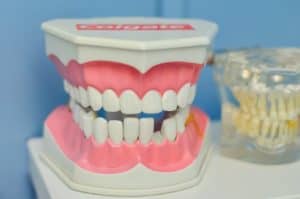Need an Extraction? Here’s What to Expect

Modern dentistry can work wonders when it comes to saving or repairing a damaged tooth. But even with the latest advances in technology and procedures, there are still situations where the removal of a tooth is necessary.
And although the idea of a dental extraction may seem extreme, the procedure is straightforward, safe, concealable, and very safe.
What is a Dental Extraction?
Put simply, a dental extraction is when a tooth is completely removed from its socket in the bones of the face and jaw. Extractions are sometimes performed by oral surgeons, and are also routinely performed by dentists and periodontists.
Once the tooth is removed and the socket and surrounding tissue heal, a dental implant is often used to take its place.
Conditions that Might Require a Dental Extraction
There are numerous reasons why a tooth may need to be extracted, whether due to injury, decay, negative impact on surrounding teeth, or cosmetic purposes. Some of the more common causes for a dental extraction include:
- Fractured or broken teeth
- Severely decayed teeth or infections
- Malformed teeth
- Impacted wisdom teeth
- Retained baby teeth
- Infected teeth or gums due to cancer medication or other radiation treatment
- Teeth that are blocking or crowding others from coming in
- Teeth blocking or distorting the fit of dentures
- Severe gum disease
The Extraction Process
A dental extraction falls into one of two categories: simple extractions, and surgical extractions.
A simple extraction is performed on an affected tooth that can be viewed from the mouth. After using a local anesthetic to make you more comfortable, the dentist will loosen and remove the tooth from its socket.
If the tooth is broken at the gum line, has not yet erupted, or has other complications, a surgical extraction may be performed. In this procedure, following the application of an anesthetic, the dentist makes an incision in the gum before surgically removing the tooth. The anesthetic blocks pain, but pressure related to the surgical extraction may still be felt.
Once the tooth is removed, a gauze swab can be held in the mouth to absorb and limit bleeding, and your dentist may prescribe pain and anti-inflammatory medication for a few days until things get back to normal.
What Should be Considered an Emergency?
Sometimes the pain or discomfort of a damaged tooth can be managed for a while. But in some instances the situation constitutes an emergency, and you should see your dentist or another professional right away.
You should seek help immediately if you are experiencing:
- Difficulty breathing or swallowing
- Serious or extreme pain or discomfort
- Persistent bleeding in the area
- A fever or chills
- Excessive swelling
How Merion Village Dental Can Help
A dental extraction can make one nervous, but the procedure is safe and effective. At Merion Village Dental, our state-of-the-art facilities and experienced staff help to make the procedure gentle, swift, and successful. To learn more about our services or to schedule an appointment, visit us online or call 614-420-2665.
Related Posts:
Recent Posts
- How Sedation Dentistry Can Help You Overcome Dental Anxiety
- Wisdom Teeth Removal: What to Expect and When It’s Time to Act
- Why Does My Jaw Hurt? Causes, Treatments, and When to See a Dentist
- How to Easily Tell if a Dentist is Accepting New Patients
- When to Get a Second Dental Opinion: Important Decisions to Consider
Archives
- March 2025
- February 2025
- January 2025
- December 2024
- November 2024
- October 2024
- September 2024
- August 2024
- July 2024
- April 2024
- March 2024
- February 2024
- December 2023
- September 2023
- July 2023
- January 2023
- November 2022
- October 2022
- September 2022
- August 2022
- May 2021
- March 2021
- February 2021
- January 2021
- October 2020
- May 2020
- November 2017
- October 2017
- August 2017
- July 2017
- June 2017
- May 2017
- March 2017
- February 2017
- January 2017
- December 2016
- November 2016
- October 2016
- September 2016
- July 2016
- June 2016
- May 2016
- March 2016
- February 2016
- December 2015
- November 2015
- October 2015
- September 2015
- August 2015
- June 2015
- May 2015
- April 2014
- March 2014
- January 2014
